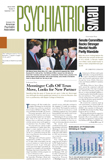As any psychiatrist knows, highly effective treatments for depression exist, yet many Americans are not getting the treatment they desperately need.
But suppose new ways to pay for depression treatment in primary-care settings were created. Suppose more stakeholders in effective depression treatment at the primary-care level, such as employers, got involved. And suppose young “turks” among primary-care physicians could be recruited to expand depression treatment. Would these efforts make effective depression treatment available to more Americans who need it?
The Robert Wood Johnson Foundation hopes so. And so does Harold Pincus, M.D., executive vice-chair of psychiatry at the University of Pittsburgh and a former director of research for APA. In fact, they are teaming up to answer these questions through a program called Depression in Primary Care: Linking Clinical and System Strategies. The foundation will provide $12 million for the program, which is to run for five years, and Pincus will be serving as national program director.
The idea for the program started to crystallize in 1999. “It really came out of a collaborative effort, thinking and working with a lot of people at the Robert Wood Johnson Foundation,” Pincus explained to Psychiatric News. “It responded to a number of things that the foundation had as its major priorities. The foundation is particularly interested in issues surrounding chronic disease and around working at multiple levels to try to make changes in the health care system. And it was particularly interested in focusing on depression because there are a lot of good data demonstrating that depression is a severe and serious condition, with a lot of implications for individuals and their families and society, and also because there is a lot of evidence that we have treatments that are effective for depression, and not only effective treatments, but ways of utilizing those treatments [in the primary-care setting]. . . . The problem is that, although we know what to do, people don’t do it. So the foundation was interested in a multilevel approach to [expanding the availability of effective depression treatment at the primary-care level].”
The program became a reality in 2000. It consists of the following three components, labeled incentives, value, and leadership:
• Through the incentives component, the program will underwrite research projects to determine whether it is feasible to change the financing of depression treatment in primary care while at the same time improving the quality of treatment. In other words, Pincus explained, “The incentives component is where we are asking for partnerships to be formed between primary-care practices and health plans. . . . The idea is to have them work together and put into place a clinical-care model that we know is effective for the longitudinal care of depression and an economic and reimbursement infrastructure” that will improve the way that care is paid for.
• In the value component, the program will underwrite research projects to explore other innovative ways of expanding effective depression treatment at the primary-care level, for example, by getting employers involved.
• Under the leadership component, the program will bring young primary-care physicians and senior people in the depression-treatment field together to conduct research projects relevant to the program’s goals. The idea, Pincus said, “is to try to identify and develop future leaders in primary care and cultivate their interest in issues around depression and mental health by linking them to senior people in the depression field.”
Some 80 different health care professionals and payers have expressed interest in participating in the incentives component of the program. They comprise a wide spectrum, Jeanine Knox-Houtsinger, manager of the program, told Psychiatric News, for instance, academic teaching hospitals, pharmacy-benefit managers, HMOs, PPOs, even some mental health carveouts. At the end of July, representatives from these groups came to Pittsburgh at their own expense to learn how to put together applications for grants in the incentives component of the program. Applications for these grants must be filed by September 28, and groups that are chosen to receive grants will be notified early in 2002.
A call for applications for grants to participate in either the value or leadership components of the program will be issued this fall.
When Psychiatric News asked Pincus what he hoped would come out of the program, he replied: “I hope it will change the way we take care of, and pay for the care of, people with depression.”
More information about the Depression in Primary Care: Linking Clinical and System Strategies program can be obtained from Jeanine Knox-Houtsinger by telephone at (412) 624-6589 or e-mail at [email protected]. ▪
